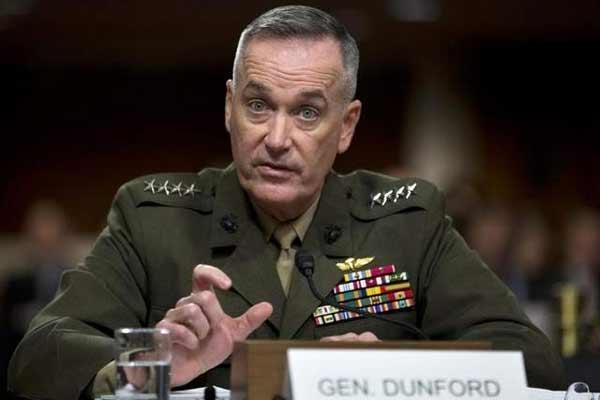Marine Gen. Joseph Dunford appeared headed for easy confirmation Thursday as the new allied commander in Afghanistan, despite a few testy exchanges with Sen. John McCain (R-Ariz.), who questioned why Dunford has been left out of high-level discussions on troop withdrawals.
Dunford testified alone at the Senate Armed Services Committee hearing. Marine Gen. John Allen, the current Afghan commander, had been scheduled to appear with Dunford on his own nomination to become head of U.S. European Command, but Allen’s nomination was put on hold during the investigation of his possible connection to the David Petraeus sex scandal.
In Allen’s absence, several senators expressed confidence that he would ultimately be confirmed, but Sen. Carl Levin (D-Mich.), the committee’s chairman, hedged his bet. “I also have confidence in him (Allen),” Levin said, “but the world being what it is, we never know what tomorrow brings.”
In his testimony, Dunford, 57, of Boston, repeatedly said that the U.S. and its allies were on a glide path to success and the establishment of a democracy capable of defending itself in Afghanistan when all coalition combat forces withdraw in 2014.
“With continued focus and commitment, I believe our goals are achievable,” said Dunford, who was dubbed “Fighting Joe” for his aggressive command of Regimental Combat Team-5 during the 2003 invasion of Iraq.
Without giving numbers, Dunford also argued for leaving behind a robust U.S. and allied force in Afghanistan after 2014 to advise the Afghan National Security Forces and carry out counter-terror missions.
Dunford made clear he was aware that his main mission will be to wind down an unpopular war, but he clashed with McCain by stressing that he has not been included as yet in strategy discussions on the pace of troop withdrawals.
McCain, now locked in a feud with President Obama over the attack on the Benghazi consulate in Libya that killed Ambassador Chris Stevens, said he had “fundamental doubts” about the Obama administration’s plans for Afghanistan. “The U.S. has committed to getting out regardless of conditions on the ground,” McCain said.
“”I also hope you will speak truth to power” and oppose a rapid drawdown, McCain said. Dunford refused to take the bait and said only “Senator, I think we’re making progress.”
McCain professed amazement when Dunford said “I have not been included in those conversations” on troop withdrawals. “That’s interesting to me, the guy who’s going to take over command is not included in those conversations. So you are a blank slate.”
Sen. Mark Begich (D-Alaska) later came to Dunford’s defense: “I don’t think you come across as a blank slate.” In a dig at McCain, Levin told Dunford “You have spoken truth to power here this morning.”
Dunford said his top priority as Afghan commander will be the growing “insider attacks” in which Afghan soldiers and police have killed more than 55 U.S. and allied troops this year. “I will be personally and decisively engaged” in curbing insider attack incidents that he said “could affect the will of the coalition. That issue will be at the top of my inbox,” Dunford said.




























